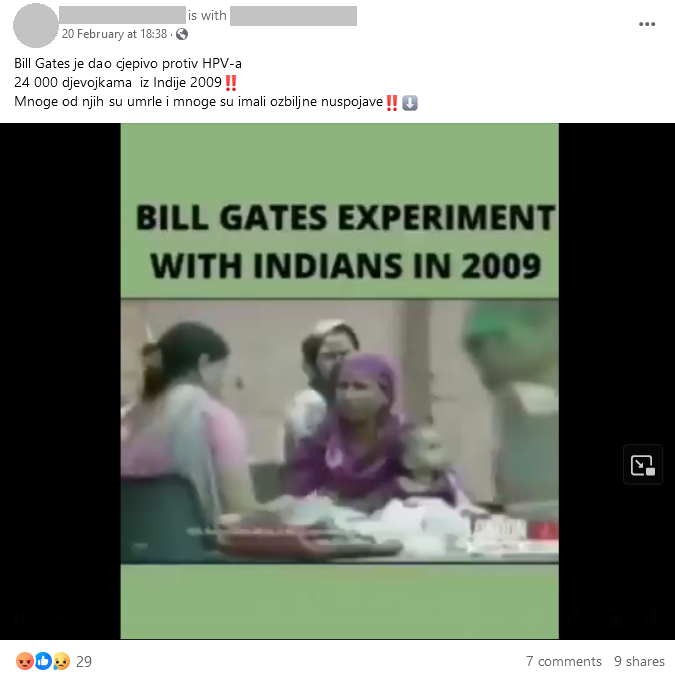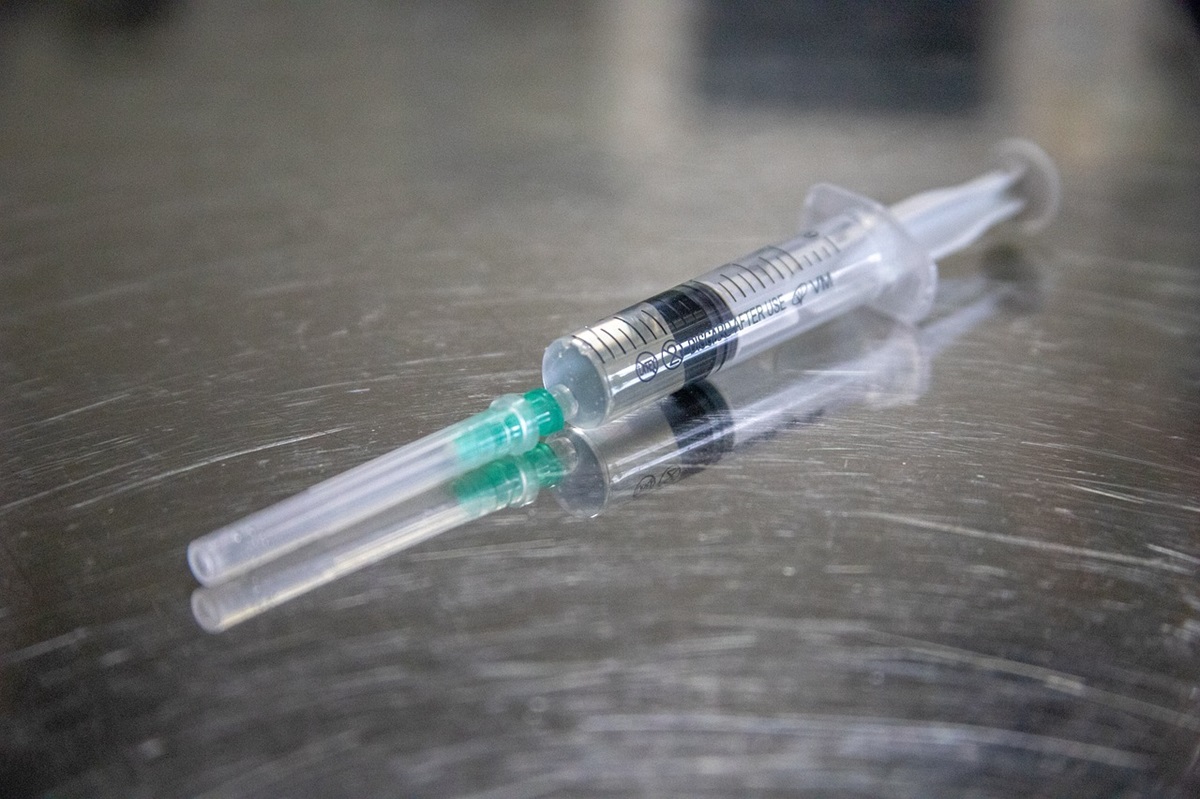Original article (in Croatian) was published on 11/3/2024; Author: Anja Vladisavljević
A 2011 report by an Indian commission concluded that the deaths of seven girls were not linked to the HPV vaccine
Social networks are rife with inaccurate and unfounded claims about the dangers of vaccines. While opponents of vaccination and conspiracy theory proponents typically target coronavirus vaccines, they occasionally turn their attention to vaccines for other diseases as well. In February, the spotlight shifted to the vaccine against the Human Papillomavirus (HPV), a known cause of cervical cancer.
A Facebook post dated February 20, 2024, claims: “Bill Gates gave the HPV vaccine to 24,000 girls in India in 2009. Many died and many suffered serious side effects” (archived here).

Accompanying the post is a 2-minute and 19-second video (archived here), where a presenter alleges that girls from Indian tribal communities were “used as guinea pigs” for an HPV vaccine produced by “two American giants.” He contends that the vaccine was ““administered to thousands of tribal girls without proper study and paperwork.” Mary Holland, Vice President and General Counsel of the American organization Children’s Health Defense, known for disseminating misleading information about vaccines, features in the video (1, 2). Holland asserts that the girls were deceived into receiving the vaccine, that the vaccine had fatal consequences, and that the Gates Foundation was subsequently “expelled” from India because of these actions.
“The people who gave these vaccines lied to the caregivers of these girls and told the girls that it would cure cancer, that they would never have cancer. These girls were also badly affected: some had seizures, some developed cancer, and seven girls died. And there was no insurance, no help for them. The Gates Foundation denied that there was no clinical trial”, Holland said.
However, extended versions of the video (archived here and here) circulating on social networks reveal it was produced during the coronavirus pandemic. These versions use the HPV vaccination case in India as a cautionary tale to underscore the alleged dangers and unreliability of the newly developed COVID-19 vaccines.
The Deaths of the Seven Girls Unrelated
In April 2020, Faktograf reported on similar misinformation surrounding the HPV vaccination project in India. This project, initiated in 2007 by Indian institutions in the districts of Khammam, Andhra Pradesh, and Vadodara, aimed to “generate evidence to support policymakers in deciding whether to introduce HPV vaccines into the public sector.” It was part of the global “HPV Vaccine: Evidence for Effectiveness” initiative, funded by a donation from the Bill and Melinda Gates Foundation, founded by Melinda and Bill Gates, Microsoft’s founder and one of the world’s wealthiest individuals. The project extended beyond India to countries like Peru, Uganda, and Vietnam. The HPV vaccine for the project was donated by the manufacturers, the pharmaceutical companies GSK and MSD.
The project was implemented in three phases, and the girls were vaccinated in the second stage. The girls belonged to the age group of 10 to 14 years. In one district, 13,791 girls were vaccinated with three doses of the vaccine, while in the other, 9,637 out of 10,259 girls received the third injection of the vaccine. The project was suspended in March 2010 after stories emerged that some of the girls who received the vaccine had died.
The Indian government responded to the concerns by assembling a team of doctors and researchers to examine whether the vaccination program was responsible for the reported deaths. In February 2011, this team reported that the deaths were not connected to the vaccination effort. Their findings were specific and varied: one girl had drowned; two succumbed to insecticide poisoning; two were victims of severe malaria; one suffered a fatal snake bite; and the last girl’s death was attributed to an illness that, according to doctors, had no conceivable link to the HPV vaccine.
“After reviewing all seven deaths (five deaths from AP in the Gardasil group and two deaths in Gujarat from Cervarix group), it has been observed that there is no common pattern to the deaths that would suggest that they were caused by the vaccine,” the report said.
The Gates Foundation Was Not Expelled from India
The Bill and Melinda Gates Foundation describes itself on its official website as a nonprofit organization dedicated to combating poverty, disease, and inequality worldwide. It frequently becomes a target for conspiracy theorists and disinformation spreaders, who often mischaracterize its philanthropic contributions and the beneficiaries of these donations—a topic Faktograf has addressed multiple times.
Claims that the Gates Foundation was “expelled” from India or that the Gateses would face trial over a vaccination project for girls have been debunked as untrue. The fact-checking website Full Fact reported last year that the Gates Foundation continues its operations in India, maintaining an office in New Delhi. Moreover, the Indian government has clarified that there is no truth to the allegations that the foundation has ceased its activities in the country.
In 2020, Reuters addressed social media rumors alleging that Bill Gates was undergoing trial in India for allegedly conducting illegal vaccine trials on children. A spokesperson for the Foundation refuted these claims, informing the media outlet that there are no ongoing lawsuits against Gates or his foundation related to these accusations. “There is no pending lawsuit against Gates or his foundation in relation to this. The vaccine trial in question was not illegal, though it was later halted and has been the source of controversy in India,” Reuters clarified.
Moreover, the Foundation’s website affirms its ongoing presence in India: “With the aim of improving the lives of millions of Indians, we work in cooperation with the Indian government and other partners on various issues, from health care and sanitation to gender equality, agricultural development and financial empowerment of the most vulnerable population groups”.
HPV Vaccines: Rigorously Tested
Authors of claims from social networks believe that it is global pharmaceutical companies that treat Indian girls from poor families as guinea pigs. The American fact-checking web portal PolitiFact, however, wrote that vaccines have gone through years of testing and become common even in the richest countries. “Australia gives it to every girl and boy between the ages of 12 and 13 in public school. Vaccination is routine in France, Germany and the Netherlands. Vaccines are on the market in more than 100 countries, and the World Health Organization recommends them as part of the national immunization program for all countries that can afford it”, writes PolitiFact.
The Gardasil vaccine against HPV has been tested and approved both in the European Union (since 2006) and in Croatia. According to the European Medicines Agency (EMA), the most common side effects of the Gardasil vaccine in trials (more than 1 in 10 people) are headache and reaction at the injection site (redness, pain and swelling). The same is true with the upgraded version of the vaccine, Gardasil 9, which protects against an additional five types of HPV.
The EMA writes that side effects at the injection site (pain, swelling and redness) and headache are “very common” (more than 1 in 10 people) and headache, and “common” side effects (up to 1 in 10 people) are bruising and itching at the injection site as well as fever, fatigue, dizziness and nausea. In the “uncommon” category (in up to 1 in 100 people) are “swollen glands (neck, armpit or groin), hives (urticaria), fainting, sometimes accompanied by tremors or stiffness, vomiting, joint pain, muscle pain, unusual tiredness or weakness, chills, general malaise”. “Rare” (in up to 1 in 1,000 people) are allergic reactions, while serious allergic reactions fall into the “not known” category because the frequency cannot be estimated based on the available data. Regarding the reported deaths and serious health conditions after vaccination with Gardasil, of which there have been only a few, the EMA has not determined their connection to the vaccine (1, 2, 3) and continues to recommend it.
Another vaccine, Cervarix, is also approved in the European Union (since 2007), which means that it has passed the testing and verification procedure. On the EMA website, there is a list and explanation of all the tests performed. It also says that “the most common side effects of Cervarix (seen in more than 1 in 10 patients) are headache, myalgia (muscle pain), injection site reactions, including pain, redness and swelling, and exhaustion (fatigue)”.
HPV: Leading Cause of Viral Infections in the Reproductive Tract
Croatia has many years of experience in voluntary and free vaccination of upper elementary school students. The Croatian Institute of Public Health (HZJZ) has been conducting an information campaign about the HPV vaccine for some time, emphasizing that “vaccination against the human papillomavirus (HPV) for girls, boys and young men is recommended in order to reduce the risk of HPV infection and the development of cancer”. HPV is the most common cause of viral infections of the reproductive tract, and most sexually active women and men become infected at some point in their lives. “For this reason, everyone who is sexually active is exposed to the risk of infection”, HZJZ points out
The public health educational project of the International Association of Medical Students “Budi mRAK!”, which strives to inform young people about risks and prevention, emphasizes that the vaccine is the best and safest prevention against cancer caused by HPV and that it is “most effective for girls and boys aged 12-13 years, before entering into the first sexual relations”. They also note that cervical cancer is the ninth most common form of cancer among women in Croatia and the third most common form of cancer among women aged 15 to 44. “Approximately 140 death cases due to cervical cancer are recorded annually in Croatia, and it is the twelfth most common cause of death due to cancer among women in Croatia.
“Cervical cancer is the third most common cause of death due to cancer among women aged 15 to 44 in Croatia”, says the website of the project “Budi mRAK!”. In addition, they point out that it is incorrect that this infection is dangerous only for women because men are not the only carriers of the virus: “In addition to cervical cancer, HPV infection can also cause cancer of the genitals and pubis in women, penile cancer in men, and cancer of the anus and posterior part of the throat, including cancer of the root of the tongue and tonsils in women and men”.
Despite the wide availability of accurate and medically verified information about the HPV vaccine (1, 2, 3) disinformation about this public health measure is constantly circulating on social networks (1, 2, 3, 4). Insufficiently developed awareness of the risks of HPV infection contributes to their spread, as well as the stigma that surrounds almost every topic in the field of sexuality and reproductive health. In addition, the post that we analyzed in this article was made during the coronavirus pandemic, when skepticism about the effectiveness and safety of vaccines was on the rise. All of this leads to a decrease in confidence in the vaccine as a method of prevention and creates fertile ground for the spread of unverified or inaccurate claims.
The Indian case from 2009, the side effects and deaths of seven girls after receiving the HPV vaccine — ultimately not directly related to the vaccination — was used to spread yet another one in a series of disinformation.



